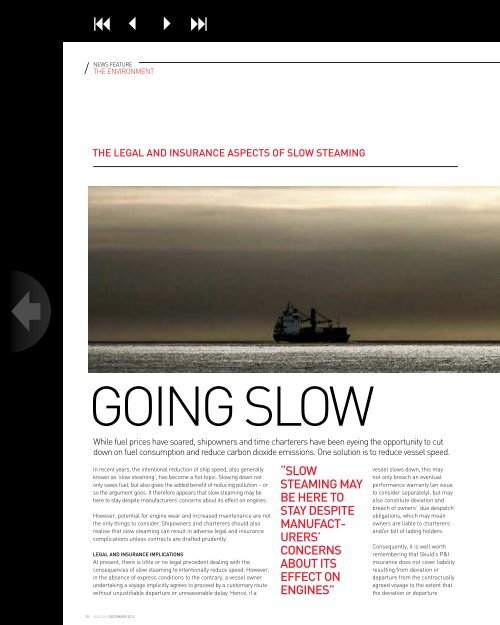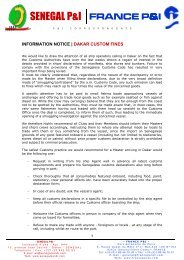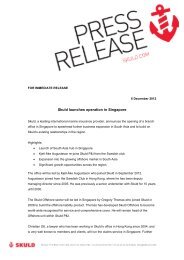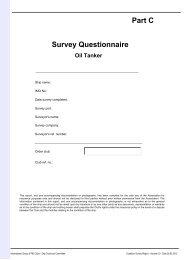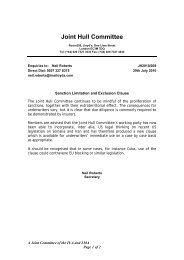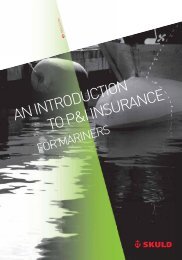You also want an ePaper? Increase the reach of your titles
YUMPU automatically turns print PDFs into web optimized ePapers that Google loves.
newS feaTurenewS feaTure/ The environmenTThe environmenT /By Peter Bløcherclaims executive, lawyer, <strong>Skuld</strong> copenhagenpeter.blocher@skuld.comknut drabløsTrainee, risk managementknut.drablos@skuld.comthe leGal and insurance asPects of slow steaminGSlow steaming can result in adverse legal and insurance complications unless contracts are drafted prudently.going Slowwhile fuel prices have soared, shipowners and time charterers have been eyeing the opportunity to cutdown on fuel consumption and reduce carbon dioxide emissions. one solution is to reduce vessel speed.in recent years, the intentional reduction of ship speed, also generallyknown as ‘slow steaming’, has become a hot topic. Slowing down notonly saves fuel, but also gives the added benefit of reducing pollution – orso the argument goes. it therefore appears that slow steaming may behere to stay despite manufacturers’ concerns about its effect on engines.however, potential for engine wear and increased maintenance are notthe only things to consider. Shipowners and charterers should alsorealise that slow steaming can result in adverse legal and insurancecomplications unless contracts are drafted prudently.leGal and insurance imPlicationsat present, there is little or no legal precedent dealing with theconsequences of slow steaming to intentionally reduce speed. however,in the absence of express conditions to the contrary, a vessel ownerundertaking a voyage implicitly agrees to proceed by a customary routewithout unjustifiable departure or unreasonable delay. hence, if a“slowsteaminG mayBe here tostay desPitemanufacturers’concernsaBout itseffect onenGines”vessel slows down, this maynot only breach an eventualperformance warranty (an issueto consider separately), but mayalso constitute deviation andbreach of owners’ ‘due despatch’obligations, which may meanowners are liable to charterersand/or bill of lading holders.consequently, it is well worthremembering that <strong>Skuld</strong>’s p&iinsurance does not cover liabilityresulting from deviation ordeparture from the contractuallyagreed voyage to the extent thatthe deviation or departuredeprives the member of the right to rely on defences or rights of limitations,which would have otherwise been available (see rule 5.2.11).liBerty clausesit is therefore paramount that any owner or charterer who contemplatesslowing down ensures that they are entitled to do so by incorporatingthe necessary provisions, not only in the governing charterparties, butalso in the relevant bills of lading.Such provisions are commonly referred to as liberty clauses and manystandard charterparty forms already contain them to varying scope andextent. moreover, bimco has also drafted specific slow-steaming clausesthat can be incorporated into both time and voyage charterparties.however, liberty clauses, or slow-steaming clauses for that matter,should be treated with caution as they are typically construed against theparty who seeks to rely on them. Therefore, a prudent owner is wise not tobe too reliant on the liberties, which the clauses appear to allow, withoutcarefully considering the commercial context that a court or arbitrationtribunal would use in its interpretation later. To give one example: if avessel embarks on a voyage with perishable cargo then – even if a broadlydrafted liberty clause has been incorporated into the bill of lading – thecarrier should consider whether the delay caused by the intended reductionin speed is likely to inflict harm to the cargo in question. if this is the case,the contractual carrier under the bill of lading may very well find himselfliable for cargo damage notwithstanding any agreed liberties.from the perspective of a time charterer, it is just as important toapply proper charterparty provisions. a time charterer who seeks toreduce fuel expenses by ordering the vessel to slow down, can end upbeing unable to validly give such an order since it may conflict with therights and expectations of a third party bill of lading holder.on a final note, it is also important to remember that if contract termsare insufficiently clear as to whether you can slow down or not, <strong>Skuld</strong>may be able to offer additional cover, but only if notification of theintended deviation is given prior to its execution.recommendations• ensure that slow steaming has been agreed in the charterparty(both up and down the chain) and that the relevant liberty orslow-steaming clause is incorporated into bills of lading• an incorporation clause in a bill of lading should ideally makespecific reference to the liberty or slow-steaming clause of thegoverning charterparty• contact <strong>Skuld</strong> to discuss the need for additional insurance or obtainspecific advice• for more information on slow steaming, please see the article‘deviation: Justified or allowed and implications for the p&i cover:slow steaming’ at www.skuld.com/deviationread morewww.bimco.org20 beacon / decemBer 2012beacon / decemBer 2012 21


